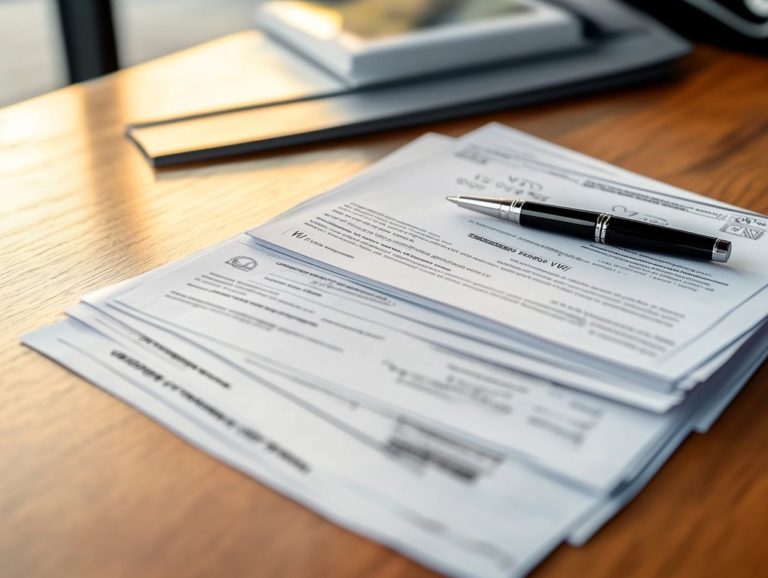Top 5 Leasing Myths Busted for New Car Buyers
Get ready to discover the truth and unlock the benefits of car leasing! Deciding whether to lease or buy a car can feel overwhelming, particularly with the sea of conflicting information at your fingertips.
You may be influenced by prevalent misconceptions about leasing, which can lead to costly missteps. This article aims to debunk the most common myths surrounding car leasing, covering the actual costs involved, credit requirements, and the flexibility it offers.
Whether you re entering the car market for the first time or seeking clarity, this guide will empower you to navigate the leasing landscape with confidence and make a well-informed decision.
Contents
- Key Takeaways:
- 1. Leasing Is More Expensive Than Buying
- 2. You Don’t Own the Car When Leasing
- 3. You Can’t Customize a Leased Car
- 4. Leasing Is Only for People with Perfect Credit
- 5. You Can’t End a Lease Early
- 6. You Can’t Negotiate the Terms of a Lease
- 7. You Have to Put a Large Down Payment for a Lease
- 8. You Can’t Drive a Leased Car As Much As You Want
- 9. Leasing Is Only for New Cars
- 10. You Can’t Buy a Leased Car at the End of the Lease
- 11. You Can’t Transfer a Lease to Someone Else
- 12. Leasing Is Only for Business Use
- 13. You Can’t Get a Good Deal on a Lease
- 14. You Can’t Get a Lease with Bad Credit
- 15. How to Decide If Leasing Is Right for You
- Frequently Asked Questions
Key Takeaways:

- Leasing can be more affordable than buying a new car.
- You can buy a leased car at the end of the lease term.
- Many leasing contracts allow for customization options.
1. Leasing Is More Expensive Than Buying
Many potential lessees believe leasing a car is pricier than outright buying one, but this notion can be misleading. With lower monthly payments and included vehicle maintenance, you could actually save a significant amount over time.
Experts point out that while the allure of ownership is tempting, buyers often overlook hidden costs associated with a car s reduction in value over time and insurance, which can inflate the total cost of ownership. Leasing offers the chance to drive a new vehicle every few years without the headache of depreciation diminishing your investment. This approach frees up your budget for other financial priorities.
Understanding the true cost of leasing versus buying empowers you to make informed decisions, potentially leading to long-term financial advantages that may not be immediately obvious.
2. You Don’t Own the Car When Leasing
A common misconception about car leasing is that you don t actually own the vehicle. While it s true, this opens up a world of leasing options that grant you flexibility and access to a broader selection of vehicles without the long-term commitment of ownership.
This flexibility is especially beneficial if you love driving the latest models packed with cutting-edge technology and features. Personal car leasing can fit into various lifestyles whether you re a family needing spacious vehicles for road trips, an urban dweller seeking compact cars perfect for city driving, or a professional looking for reliable options for business use.
Leasing simplifies maintenance responsibilities, providing an experience tailored to diverse needs while keeping your monthly expenses predictable. Many find that leasing not only simplifies mobility but also enhances their overall driving experience, all without the hefty price tag that comes with ownership.
3. You Can’t Customize a Leased Car
Many people assume that leasing a vehicle means sacrificing the ability to customize it, but that s not entirely true. Within the realm of leasing standards and policies, there are options that allow for a bit of personalization without risking your leasing agreement.
For instance, minor upgrades like enhancing seat covers, adding stylish floor mats, or installing a portable GPS system are generally acceptable. However, significant changes such as altering the paint color or modifying the vehicle s structure may be off-limits due to their potential effects on resale value.
It s essential to closely review the specific terms of your leasing agreement, as different leasing companies have their own guidelines. Some may even provide flexibility, allowing certain modifications as long as they are reversible and don t compromise the vehicle s integrity.
Are you ready to explore your leasing options today?
4. Leasing Is Only for People with Perfect Credit
A common misconception is that leasing is reserved solely for those with flawless credit. In truth, many leasing companies provide flexible options and terms that cater to a wider array of credit scores, making leasing accessible to more consumers than you might realize.
The reality is that the impact of credit scores on leasing applications can vary considerably. Financial experts indicate that while a higher credit score typically results in more favorable terms and lower deposits, individuals with less-than-perfect credit should not feel disheartened. By showcasing reliable income, providing solid references, or even offering a larger down payment, you can significantly boost your chances of securing a lease. Some leasing companies take into account factors like rental history or employment stability, which can further benefit those with imperfect credit profiles.
It’s crucial for potential lessees to engage in open communication with leasing agents and explore all available options.
5. You Can’t End a Lease Early
While many assume that terminating a leasing agreement early is off the table, there are indeed circumstances and options that might allow you to break that lease, though it often comes with the potential for hefty charges or penalties.
Understand the specific terms of your leasing agreement, as it typically outlines the conditions under which early termination might be allowed. For example, some agreements include clauses that permit lease termination in cases of job relocation or financial hardship; however, these usually come with steep fees that can considerably strain your budget.
Don’t wait until it’s too late! There are countless cautionary tales of lessees who encountered serious consequences. These include losing their security deposit or facing small claims court due to misunderstandings about their rights and obligations. It’s crucial for anyone contemplating this route to diligently read their lease and seek legal advice when necessary, as the repercussions of mistakes can add unnecessary stress to an already challenging situation.
6. You Can’t Negotiate the Terms of a Lease
A common misconception is that leasing terms are unchangeable; however, many leasing companies are quite receptive to negotiation. Key elements that are often open for discussion include monthly payments and mileage allowances, both of which can greatly influence the overall affordability of your lease. You might not realize that tweaking these figures can lead to terms more aligned with your financial needs.
In such cases, leasing experts people who specialize in lease agreements become invaluable allies. Use their expertise to navigate the complexities of lease agreements, ensuring that you secure the most favorable arrangements tailored to your lifestyle and driving habits.
7. You Have to Put a Large Down Payment for a Lease

It’s a common misconception that a hefty down payment is a must when leasing a vehicle. In reality, many leasing options offer the possibility of lower or even zero down payments, making it easier for you to manage your monthly budget.
This flexibility can significantly reshape the overall cost structure of a lease, highlighting the importance of exploring various offers. Leasing companies understand that everyone’s financial situation is unique, so they often provide tailored plans for those who prefer smaller initial payments.
For example, opting for a lower down payment might lead to higher monthly payments, but it allows you to secure a vehicle without putting undue strain on your finances. Conversely, if you’re in a position to make a larger upfront payment, you could enjoy potentially reduced monthly fees.
Grasping these nuances gives the power to you to choose the leasing option that aligns perfectly with your financial goals.
8. You Can’t Drive a Leased Car As Much As You Want
Many potential lessees fret about whether they can truly drive a leased car as much as they desire. However, by grasping your mileage allowance in the leasing contract, you can ease those worries and avoid extra fees at the end of the lease term.
Typically, mileage allowances are set in increments, such as 10,000 or 12,000 miles annually, which are the standard for most leasing contracts. If you exceed this limit, you might face hefty fees, often calculated on a per-mile basis that can accumulate rapidly.
If you foresee a busier driving schedule, it s wise to explore flexibility in the mileage cap before you commit. Negotiating a higher limit or choosing a plan that matches your driving habits can offer you peace of mind and financial savings, ensuring that your leased vehicle meets your needs without the constant concern of extra fees.
9. Leasing Is Only for New Cars
A common misconception is that leasing is solely for new cars. Leasing used cars can provide similar benefits without the hefty new car price tag.
This alternative can be particularly advantageous for those who are budget-conscious yet desire the flexibility leasing provides while keeping monthly payments manageable. By choosing a used car lease, you not only gain access to a broader array of makes and models but also enjoy lower depreciation rates associated with pre-owned vehicles.
As a result, securing a reliable car becomes much easier and far more cost-effective. Plus, leasing a used car often comes with extra perks, such as warranties and maintenance packages, ensuring peace of mind throughout your lease term.
10. You Can’t Buy a Leased Car at the End of the Lease
Contrary to popular belief, you often have the opportunity to purchase a leased car at the end of your leasing term, effectively transforming your agreement into ownership if you so desire.
This buyout option (the chance to buy the car at the end of the lease) is usually outlined in your original lease agreement, providing you with the flexibility to make a significant financial decision. Take time to weigh your options and make the best choice! Consider the car’s current market value in relation to the buyout price, its condition, and any potential future maintenance costs.
Financial experts recommend assessing how well the vehicle has performed throughout the lease period and whether it still aligns with your needs. Gaining a clear understanding of the implications, including tax considerations and financing options for the purchase, can empower you to make a well-informed decision.
11. You Can’t Transfer a Lease to Someone Else
A common myth suggests that transferring a lease to another person is impossible, but the reality is that many leasing companies offer policies that facilitate lease transfers. This provides you with transparency and options when circumstances change.
To make this transfer happen, the new lessee typically needs to meet certain eligibility criteria, such as proving their creditworthiness or agreeing to take on ongoing payment responsibilities. The leasing company will often require a formal application and may impose a transfer fee, which can vary depending on the original lease agreement’s terms.
It’s essential for both you and the new lessee to understand any existing obligations, including potential mileage limits and maintenance responsibilities. Act quickly to explore your transfer options to avoid potential fees or penalties. A smooth transition may require coordination with the leasing company to finalize the paperwork and ensure everyone is content with the new arrangements.
12. Leasing Is Only for Business Use
Leasing isn’t just for businesses; personal contract hire options are widely available, making vehicle leasing an enticing choice for consumers like you who seek flexibility and affordability.
This financing method lets you experience the thrill of driving a new car without the long-term commitment of ownership. It caters to those who prioritize cost-effectiveness. Unlike business leasing, which typically focuses on tax benefits and commercial mileage limits, personal leasing allows everyday drivers to enjoy lower monthly payments while benefiting from regular vehicle upgrades.
Many individuals find leasing advantageous due to its predictable maintenance costs, making budgeting simpler. You can drive the latest models, which can significantly enhance your driving experience and make leasing a compelling alternative to an outright purchase.
13. You Can’t Get a Good Deal on a Lease
Many people think landing a great deal on a lease is an impossible feat, but with a solid understanding of leasing rates and effective negotiation skills, you can uncover favorable leasing options that offer significant benefits.
Taking the time to research various leasing alternatives is essential. This means not just visiting different dealerships but also exploring online platforms that aggregate rates. As a prospective lessee, it s important to compare terms and monthly payments to ensure they align with your budget and preferences.
Understanding the financial details such as the residual value and interest rate for leasing can provide critical insights that empower you during negotiations. Talking with multiple leasing firms can reveal hidden opportunities and lead to better deals, ensuring you feel informed and confident in your decisions.
14. You Can’t Get a Lease with Bad Credit

A common misconception is that you can’t secure a lease if you have poor credit. However, many leasing companies offer flexible options specifically designed for individuals with poor credit.
By tapping into the expertise of leasing professionals, you can access a range of tailored solutions that often fly under the radar. These experts typically have established relationships with landlords and can advocate on your behalf, guiding you toward properties that are more sympathetic to financial challenges.
Improving your credit score through responsible financial practices can significantly boost your chances of lease approval. Focus on these key areas:
- Paying off outstanding debts,
- Addressing any inaccuracies on your credit reports,
- Limiting new credit inquiries.
By doing so, you ll create a much stronger application overall.
15. How to Decide If Leasing Is Right for You
Deciding whether leasing is the right choice for you requires careful evaluation of your financial landscape, vehicle preferences, and a thorough understanding of the leasing options available. Check out a detailed leasing guide and consider seeking advice from financial experts to navigate this decision effectively.
Reflect on your lifestyle and how a vehicle will fit into your daily routine. For some, the flexibility of leasing may resonate more with their ever-changing circumstances, while others might find that the commitment of purchasing aligns better with their long-term aspirations.
The financial implications like monthly payments, potential maintenance costs, and insurance can significantly influence your decision-making process. Engaging with leasing specialists can provide you with invaluable insights tailored to your unique needs, empowering you to make smarter, more informed choices that harmonize with your budget and preferences.
What Are the Key Differences Between Leasing and Buying a Car?
Understanding the key differences between leasing and buying a car is essential for you as a prospective vehicle owner. Each option offers unique advantages and considerations, including monthly payments, vehicle ownership, and the specifics of leasing contracts.
For many, the decision hinges on long-term financial implications and personal lifestyle preferences. When you choose to lease, you often benefit from lower monthly payments and the thrill of driving a new vehicle every few years. This can be particularly appealing if you appreciate the latest technology and performance. However, leasing means you won t own the car outright, and you’ll need to follow mileage limits and other stipulations.
On the flip side, purchasing a car can provide you with greater financial freedom over time. Owning a vehicle outright not only leads to true ownership but also offers potential resale value. This makes it a more suitable choice for those who prefer stability and are ready to invest in a long-term asset.
What Are the Pros and Cons of Leasing a Car?
Leasing a car offers a unique blend of advantages and drawbacks. It presents enticing benefits like lower monthly payments while also harboring potential pitfalls that could lead to leasing nightmares if not handled with care.
While those lower payments might make that sleek, brand-new vehicle feel within reach, be wary of hidden fees and mileage limits that can easily catch you off guard. For instance, consider someone who faced hefty charges for exceeding their mileage limit, which added thousands to their overall cost. This story shows how crucial it is to understand your leasing terms.
Navigating the fine print of a leasing agreement can feel overwhelming. Without reliable assistance, you risk unexpected charges or penalties that could leave you reeling. Getting informed guidance can make your leasing experience a breeze!
What Are the Common Misconceptions About Leasing a Car?
Numerous misconceptions surround car leasing, often referred to as leasing myths, and they can cloud your judgment. To gain clarity, it’s important to understand the top myths about car financing, which could enhance your experience as a lessee.
You might think that leasing is just like renting, leading you to believe that you won t build any equity the value you build over time in a car you own. This perspective misrepresents the leasing process, which allows you to enjoy all the perks of driving a new car without the long-term commitment and depreciation headaches that come with buying.
Concerns about high payments and hidden fees can further intimidate you, especially when leasing offers flexibility and lower upfront costs. By addressing these misunderstandings, you can gain a clearer perspective on how leasing works and discover the potential advantages it can bring to your driving experience.
How Can You Get the Best Deal When Leasing a Car?
To secure the best deal when leasing a car, employ effective leasing strategies and negotiation techniques that capitalize on your understanding of leasing companies and their offerings.
This means conducting thorough research to grasp the various leasing options available, including the terms, conditions, and fees tied to each one. By comparing different companies and their offerings, you can pinpoint those that provide the most favorable terms.
Adopting a strategic approach during negotiations can further enhance your flexibility. Discussing mileage limits, maintenance responsibilities, and the possibility of lease modifications can lead to a deal tailored to your specific needs. Engaging with dealerships or leasing agents armed with informed questions showcases your preparedness and can encourage them to present more attractive packages.
What Are the Alternatives to Leasing a Car?
Explore different alternatives to leasing a car. Consider options like outright ownership or other vehicle solutions.
Among these choices, traditional financing often emerges as a favored option. Traditional financing means taking out a loan to buy a car. This allows you to make monthly payments while gradually building equity in your vehicle. With this approach, you can enjoy a sense of ownership, giving you the freedom to customize your ride without restrictions.
However, long-term financial commitments are typically required. This may include interest payments. The risk of depreciation is significant. On the other hand, purchasing a vehicle outright with cash gives you the advantage of complete ownership from day one, meaning no monthly payments at all. Yet, this option demands a substantial upfront investment, which may not be feasible for everyone.
Therefore, it s crucial to weigh these alternatives based on your personal financial situation and lifestyle preferences.
Frequently Asked Questions

What are the top 5 leasing myths that new car buyers should know?
The top 5 leasing myths are:
- Leasing is more expensive than buying a car.
- You can only lease new cars.
- Leasing is only for people with perfect credit.
- You have to put down a large down payment to lease a car.
- You have to stick to a strict mileage limit when leasing a car.
Is leasing really more expensive than buying a car?
No, this is a common misconception. In many cases, leasing can actually be more affordable than buying a car because you are only paying for the depreciation of the vehicle during the lease term, rather than the full cost of the car.
Can you only lease new cars?
No, you can also lease certified pre-owned vehicles. These are used cars that have gone through a thorough inspection and certification process by the manufacturer.
Do you need perfect credit to lease a car?
While having good credit can certainly help you get a better lease deal, it is not a requirement. Many dealerships offer leasing options for people with less than perfect credit.
Do you have to make a large down payment when leasing a car?
No, it is not necessary to make a large down payment when leasing a car. However, a larger initial payment can lower your monthly lease payments.
Is there a strict mileage limit when leasing a car?
While there is a mileage limit when leasing a car, it is not as strict as many people think. Most leases allow for 12,000-15,000 miles per year, and you can often purchase additional miles if needed.
Considering all options is crucial. You want to find the best financial fit for your lifestyle! For more information on leasing and financing options, consider consulting a financial advisor.






